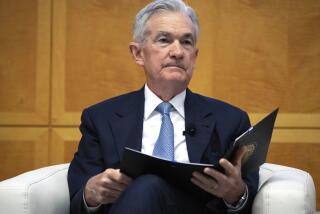Don’t Let War Make Bad Budget Policy, Greenspan Warns Panel
- Share via
WASHINGTON — Federal Reserve Board Chairman Alan Greenspan cautioned Tuesday against any quick changes in economic policy in reaction to the war in the Persian Gulf or the national recession.
In testimony before the House Budget Committee, Greenspan argued that economic policy-makers should stay the course on monetary, tax and budget policies, at least until the impact of the war on the American economy becomes more apparent.
He said the Fed has no plans to change monetary policy in order to cut interest rates more rapidly than at the pace set before the war began last week. The central bank has slashed rates six times since the gulf crisis began in August but has not cut rates since the fighting started.
The Fed chairman’s remarks were certain to draw some criticism. Some analysts argue that the Fed should be moving more quickly to deal with the combined effects of the banking crisis, the recession and the volatility that may hit the financial markets if the war drags on.
But Greenspan said that despite the increasing uncertainty hitting the economy, the Fed won’t be stampeded into taking steps that might spur inflation later, adding, “We expect our (previous moves) will provide (enough) support to economic activity in the quarters ahead.”
Greenspan also urged Congress and the White House not to raise taxes to finance the war, contending that it is too early for policy-makers to determine how much the war will actually add to the federal budget deficit.
“A surcharge at this stage is very clearly premature, and hopefully it won’t be needed at all,” the Fed chairman said. “If I thought there would be an inflationary impact from (the war’s costs) I would feel differently, but right now I don’t see that.”
Greenspan said that since much of the materiel being used in the Persian Gulf was bought and paid for years ago during the Reagan-era military buildup, the war may not require the big budget outlays that many now fear.
Much of that military equipment will not have to be replaced because of the end of the Cold War, so its use now will not necessarily translate directly into future defense costs, Greenspan said.
But he also warned that Congress should not attempt to change tax or budget policies based on the first week of the war. “At the moment, we do not have enough information to determine whether changes in taxes would be desired, or necessary,” he told lawmakers.
“We don’t have enough information to know what should be done. So I don’t see any urgency in dealing with the war’s costs. I should hope that very little significant fiscal action will be required.”
Greenspan’s opposition to a war-related tax increase mirrors the position of the Bush Administration, which has already made it clear that it has no plans to seek such a temporary surtax.
Instead, the White House plans to finance the war through deficit spending, and also by prodding other major nations, especially Japan and Germany, to pay a large portion of the costs of Operation Desert Storm.
At the same time, Greenspan sought to warn against any efforts by Congress to kill last fall’s five-year deficit-reduction agreement in order to stimulate the economy in the midst of the recession.
The White House appears to still be committed to the deficit-reduction accord, but some analysts fear that with the nation simultaneously at war and in a slump, pressure may build in Congress to lift the cost-cutting provisions of the agreement.
While the costs of the war are exempt from the budget-cutting pact, Greenspan said he was especially concerned that the recession might persuade some in Congress that the economy could use a jump-start from more federal spending.
“I am concerned that there might be an effort to stimulate the economy by expanding the deficit, and that would be a mistake,” Greenspan said. “If you unravel the budget agreement, I think it would be very difficult to put it back together.
Congress and the White House shouldn’t back away from the deficit-reduction accord “unless you see far more extraordinary events than we have already seen affecting the economy,” Greenspan said.
GREENSPAN AS THE SPHINX
Columnist Tom Petruno wants to know what the Fed chief will do about interest rates. Market Beat, D3
More to Read
Get the L.A. Times Politics newsletter
Deeply reported insights into legislation, politics and policy from Sacramento, Washington and beyond. In your inbox twice per week.
You may occasionally receive promotional content from the Los Angeles Times.










